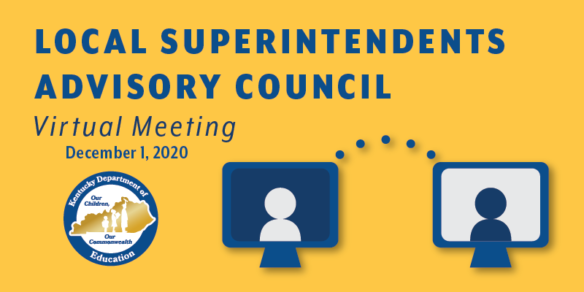
- KDE Associate Commissioner Rhonda Sims and her staff spent the majority of the special meeting answering questions about the minimum number of students needed to form a student demographic group for accountability and reporting.
- The Office of Assessment and Accountability has sought feedback from various advisory groups on these changes to the accountability system.
By Jacob Perkins
Jacob.perkins@education.ky.gov
During a Dec. 1 special meeting of the Local Superintendents Advisory Council (LSAC), members recommended the Kentucky Board of Education (KBE) not take action on the amendment to 703 KAR 5:270, Kentucky’s accountability system, and instead continue with a second reading at the board’s regular meeting in February.
LSAC’s special meeting was scheduled during the council’s Nov. 24 meeting, where members felt they needed additional time to gather feedback from colleagues, submit questions to Kentucky Department of Education (KDE) staff and review the presentation from that meeting before submitting their recommendation to the KBE ahead of its Dec. 2 meeting.
The amendment to the state’s accountability system is currently on the KBE’s agenda for that meeting for a first read and as an action item. To speed up the process on noncontroversial and/or technical changes to regulatory items, the board now can act after a first read, said Commissioner of Education Jason E. Glass. For matters that are more contentious or complex in nature, the KBE can have a second reading to allow more time for input and deliberation.
“This is one of those items,” he said, indicating this issue warranted a second reading.
KDE Associate Commissioner Rhonda Sims and her staff in the Office of Assessment and Accountability (OAA) spent most of the special meeting answering questions on the minimum number of students needed to form a student demographic group for accountability and reporting.
The performance of student groups included in accountability and public reporting currently is set at 10 or more per grade. This standard helps protect student privacy by making it harder to identify the scores of individual students.
Kentucky has historically used a minimum of 10 students per grade, which applies to schools and student groups. Now, KDE is recommending switching to 30 students per school for accountability, while still counting 10 students per grade for public reporting.
OAA has sought feedback from various advisory groups on these changes to the accountability system. One suggestion has been to continue counting 10 students per grade, while also adding the 30 per school. OAA is unsure if this would be allowed at the federal level, Sims said.
“I don’t believe there is anybody using a combination nationally, but that is a notion that has been proposed that pulls together what we did with this idea of a new 30,” she said.
Jennifer Stafford, director of KDE’s Division of Assessment and Accountability Support, reminded the council that the number of students in a student group also factors in how Targeted Support and Improvement (TSI) and Additional Targeted Support and Improvement (ATSI) schools are identified.
“We’re not just talking about the students in the indicators within the overall accountability,” Stafford said. “It is also the number of groups within the school eligible for the identification of those federal classifications.”
Based on the feedback received from council members since the Nov. 24 virtual meeting, Sims said there still is a split on which number the group would recommend.
“There were some folks who liked moving to 30 and others who weren’t so sure about the impact,” she said.
The recommendation made by LSAC now will go to the state Board of Education, which will shift to a first reading without action in December, and then a second reading and as an action item in February. This also will provide another opportunity for the LSAC to review the changes before the KBE’s February meeting.
“When you talk about the state’s accountability system, we want all opportunities for input to be gathered,” Glass said. “We want everything to be vetted and well thought through.”




Leave A Comment